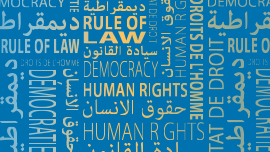A common legal space across the two shores of the Mediterranean: a long-term goal

Mathieu Chardon, on the left, first secretary international union of judiciary bailiffs and officers, and Helene Jouy, of European Commission on Efficient Justice (CEPEJ), in Casablanca
Council of Europe conventions are considered as a key reference to promote human rights, democracy and the rule of law and achieve a common legal space at pan-European level and beyond. They form the legal acquis of the Council of Europe and the European Union as well since all EU members are Council of Europe members as well.
There is no doubt that accession to Council of Europe conventions is strategically important in the process of progressively creating a common legal space between Europe and the Southern Mediterranean thus raising the level of intergovernmental co-operation between the signatories of the conventions and compliance with European and international standards. Council of Europe action promoting a good understanding as well as an effective implementation of its conventions will therefore be pursued, with a view to raise awareness on these legal instruments and the related rights among national authorities, members of Parliaments, civil society and in particular the Programme’s target groups.
The European Convention on Human rights is one of the most important Council of Europe conventions and often considered as the “jewel in the crown”. It is still the only international human rights agreement providing such a high degree of individual protection. Adopted in 1950, it has integrated an independent monitoring system, namely the European Court of Human rights in Strasbourg, ensuring effective protection of citizens in the Council of Europe 47 member states. It is important to note that, even if the European Convention on Human Rights is not open to non-member States of the Council of Europe, the spirit of its articles are spread well beyond Europe through various programme's activities so that it can be used as a reference by our stakeholders when dealing with issues related to human rights and democratic governance in general. As a way of example, debates and strengthening of capacities around Art. 10 of the Convention, which is dedicated to freedom of expression and association, helps our partners understand the importance of rights based approach in human and social development.
Furthermore, new generation of Council of Europe conventions (e.g. Medicrime, trafficking, violence against women) address issues which nowadays constitute global threats to human rights and the rule of law. More recently, the Convention against trafficking in human organs, also open to non-member States was adopted by the Committee of Ministers.
The advantage of this Council of Europe legal acquis and Council of Europe conventions, in particular, is that a part of it (159 out of 218 in total) is open to non-member states of the Council of Europe. A number of countries in the Southern Mediterranean have already expressed, officially or unofficially, interest in becoming Contracting Parties to Council of Europe conventions. In particular, Morocco has officially requested to be invited to accede to a significant number of those instruments. Also Tunisia showed interest in the content of certain key conventions and has ratified the Convention on Mutual Administrative Assistance in Tax Matters and its amending protocol. Likewise, Algeria and Jordan have requested relevant information on certain conventions, thus initiating the way for future accession.
 Latest news
Latest news
 Related links
Related links
Council of Europe
CoE and the Southern Neighbourhood
Office of the Directorate General of Programmes










